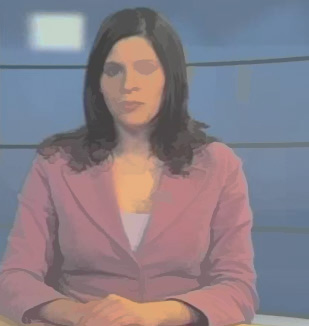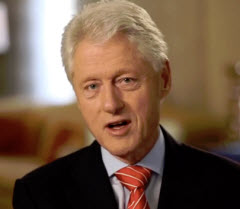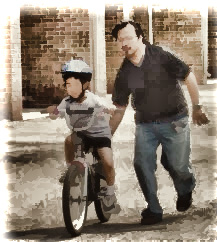Source of article Jury Insights.
Part 4
Appropriate Attitude;
Being Spontaneous
Showing Appropriate Focus, Attitude and Demeanor
Explain that (even in video depositions) only verbal responses can be recorded as text, and it is much better to say “yes” or “no” rather than yeah or nah.

Instruct your key witness to sit with a slightly forward lean toward the examiner, with hands relaxed and overlapping on the table; the hands may clasp, but without the fingers interlaced (which can reveal white knuckles under stress).

The witness should maintain eye contact, which means generally allowing the eyes to fall on and move around the examiner’s face; eye contact is not a stare-down contest. Bill Clinton is the master of eye contact. He relaxes and tilts his head slightly while listening, while being totally engaged and focused upon the interviewer.
Professionals and academics should use lay language. In a sense, using everyday language also applies to less educated witnesses who may unwittingly try to sound more sophisticated or erudite, but counter-intuitively end up sounding pretentious. Again, using Bill Clinton as a model, when Clinton answers questions, you can literally see his eyes momentarily cast slightly downward as he is translating and distilling a complex thought into everyday lay language.
Explain to the witness that it is a bad idea to try to hide or be evasive about information that opposing counsel is certain to expose anyway. This is difficult in content areas that the witness experiences as humiliating or shameful. You should attempt to draw out and discuss such content before the deposition, and reframe it into responses that reflect the spirit of “what’s so” and “so what.” The attempt to hide shameful information merely confirms to the listener that it is something “awful.”
There are certain types of verbal tics that can be detrimental to testimony, and yet difficult to change, including “you know,” “to tell you the truth,” “honestly,” “as a matter of fact,” and so on.
It is critically important that the key witness stay calm (easy to say, hard to do) and recognize triggers to frustration and anger. Many people react with anger when they feel disrespected or falsely accused. By the time the case gets around to deposition, you should already be aware of triggers and tells of your witness’ buttons. Anger is expressed in many more ways than just raising one’s voice and name calling. Instruct your witness never to use cynicism or sarcasm or any other type of sparring or retaliatory response to the examiner. Along these lines, it is almost always an error for the witness to use humor, even self-deprecating humor, during a deposition; there are a hundred ways for humor to go sideways.
Sometimes, a witness may be overwhelmed with grief, pain or other emotions. Let your witness know that organic weeping is perfectly okay during deposition. If there is a need to take a break, take as long as may be required before getting back on the record. Crocodile tears are never okay.
Many witnesses enter into deposition with confusion of the role of the attorney and the role of the witness. As a result, some witnesses will jump from their role as fact journalist over to the role of attorney advocate, sending inappropriate editorial messages along with the content of testimony.
It is generally a good idea to train the witness to respond to any objection you make at the deposition by asking for the question to be repeated and take the time to think about why you may have objected.
Explain that while the witness may not ask for a break while a question is on the table, that frequent breaks are acceptable and provide some time to talk things over with you. Work the breaks. For witnesses with physical issues, the witness should be encouraged not to be bashful about asking to stand, stretch, drink water, eat, take meds, go to the bathroom, etc.
Being Spontaneous
It is a paradoxical and self-defeating instruction to tell anyone to “Be spontaneous!” Any behavior that follows that instruction is sure to be self-conscious.

Relaxed spontaneity is a complex experience to bring about in others. Like teaching a child to ride a bike, the teacher should take a supportive and increasingly invisible role, while the child experiences enough safety to take a risk. The child discovers balance, without being taught balance. Being a good teacher often involves doing good deeds outside of the consciousness of the learner.
Some witnesses begin witness preparation with the notion that the attorney is going to tell them what to say at the deposition. The attorney may unwittingly confirm this notion when giving criticism or recommending definitive restatements during a witness’ role-play. Correcting the witness can be a little tricky.
You’re not paranoid if someone is really out to get you…
The problems stems from the malignant reality that it is not paranoid to believe that opposing counsel will try to trip up the witness, and that deposition testimony is in great part a game of defense. It is difficult for the witness to win extra points during deposition, but it is often possible to lose points.
When the attorney starts to look worried, the witness starts to get worried– and wants to take more and more notes in the hopes of memorizing testimony and not screw up. This can become a vicious spiral downward in the witness preparation process.
Note taking during witness preparation should be discouraged when the witness is clearly doing it out of fear.
The ability to be spontaneous, in the moment and improvisational comes from confidence. The witness who tries to memorize and rehearse testimony is probably going to forget, become flustered and decompose during deposition.
At the root of the difficulties in key witness spontaneity is often witness confusion about the strategic or legal issues in the case. The attorney has not explained these issues to the witness or the ways in which the witness’ testimony is going to fit into the overall case.
Here’s the elusive obvious-if you can’t effectively explain the strategic and legal issues of the case to your witness you are not going to be able to do it for the jury either. You have to be able to articulate the landmarks and landmines of the case to your witness. Your witness has to be able to understand your overall case from the jury’s (or judge’s, in a bench trial) point of view, and your witness has to understand how his/her testimony fits into the strategic narrative. Only then can your witness express answers to difficult questions spontaneously.
Future Posts
The attorney must be able to assess the intelligence, personality, emotional capabilities and other limitations of a witness in forming your expectations for that witness.
If your key witness is a lay expert such as a company engineer or CPA, you may need to teach this witness the additional skills required of an expert witness.
I will address these issues in future posts.
Alan J. Cohen Ph.D. LLC
